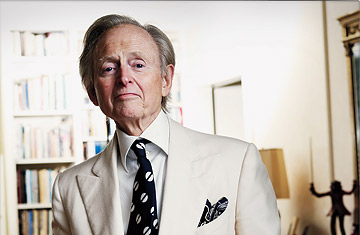
Tom Wolfe
Will you ever return to nonfiction? Jeff Lewis, ADA, MICH.
I'm working on a book called Back to Blood. It's a novel set in Miami, and much of it has to do with immigration. But if I could have found one real story, I would have done it. I still believe nonfiction is the most important literature to come out of the second half of the 20th century. Nonfiction is never going to die.
What are your feelings on the current state of fiction? Andrew Herold, JOHANNESBURG
There's so little of it now that it's pathetic, and it's pathetic all over. Writers come from master-of-fine-arts programs now. If you add up the college education of Steinbeck, Hemingway and Faulkner, you get to spring break of freshman year.
After Acid Test was published, did you ever visit Ken Kesey? Mindy Weiser, LAS VEGAS
No. I didn't hear a single thing about his reaction to it until about five years later. He said, "Well, he got most of it right, except when he tried to be nice." He was right. I shouldn't have pulled my punches. You should never do that, not if you're writing nonfiction.
Did you ever use LSD or marijuana? John Foster JEJU-DO, SOUTH KOREA
No, I never did. LSD is too strong to take. I write about it in the book. They take it once, and for years afterward, they have these flashbacks. Just driving over a bump in the road on a motorcycle can do it. I tried marijuana once.
Has the drug culture been stripped of its intellect? Max Stendahl, IPSWICH, MASS.
Ha! That's assuming that it had an intellect. It inevitably leads to total lack of intellect--particularly in the case of LSD, which everyone assumed opened the doors of perception. We've since discovered that it does the opposite.
You always speak glowingly of Hunter S. Thompson. Could you describe how he impacted your writing? Michael R. Trevino PONTIAC, MICH.
He was the great comic writer of the 20th century. I really do consider Hunter as being in the tradition of Mark Twain. Gonzo journalism, as he called it, is exactly what Twain did in things like The Innocents Abroad. You do some reporting of what's actually there, but you also let your imagination free. You're not deceiving anybody because they know that's what you do.
Is New Journalism still alive? If so, is it any better than in the pioneering '60s, or has it just become old journalism? Thabo Jijana
Port Elizabeth, South Africa [Laughs.] Well, the problem is, when you call any kind of movement new, you've already doomed it to an early death. There is some of it now, and it usually comes out in books. Mark Bowden's Black Hawk Down is an example of it and a very good one. I don't see it that much in magazines.
Who today is displaying "the right stuff"? Mark Gagne, LA JOLLA, CALIF.
I've often been asked to speak in business meetings about The Right Stuff. I always ask them, How many people in your organization have died in the last 10 years? The Right Stuff is about people who make it their profession to risk their lives. I don't know of anybody [who does that] other than people in combat in Iraq or Afghanistan or wherever else.
Do you regret saying you intended to vote for President Bush? Derek Traub, WASHINGTON
Whenever I enter a room full of journalists or writers, they give me a look as if I had just raised my hand and said, "I'd like to let you know that I'm a child molester." There's that insular attitude. I wish I had never said a thing. I don't think journalists should talk about whom they're voting for.
Do you ever get tired of being known for your white suits? David Royce WESTPORT, CONN.
It has done me so much good. Not long after I published my first book, I quickly found I was terrible at being interviewed. But then I'd read the piece and it would say, "What an interesting man; he wears white suits." And so it was a good 10 years where the suits were a substitute for a personality.
VIDEO AT TIME.COM To watch a video interview with Tom Wolfe and to subscribe to the 10 Questions podcast on iTunes, go to time.com/10questions
Next Questions Ask Bill O'Reilly your questions for an upcoming interview at time.com/10questions
